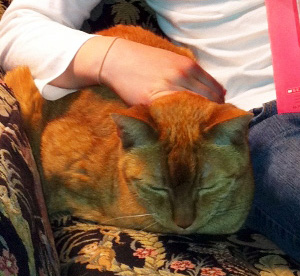
Seattle veterinarians explain changes in acceptable “common” problems.
MishMish, our February 2014 Pet of the Month is one lucky cat. After several years of intermittent symptoms, his owners decided to pursue finding an answer for his chronic vomiting. While he was ultimately diagnosed with Small Cell Intestinal Lymphoma, he is responding well to a treatment plan, feeling much better, and has a reasonable chance of living well with his cancer.
MishMish had a long history, typical for many cats, of occasional vomiting. Thinking back his owners thought he had symptoms beginning as early as November 2006. He was eating a variety of foods over the following years and maintaining his weight so the vomiting did not seem to be a concern. In December 2010, MishMish’s occasional vomiting was discussed but it seemed to be normal and was not a concern to the owner at that time. After all, isn’t it normal for cats to vomit sometimes? MishMish did have some other medical concerns so we submitted blood and urine to the lab to get baselines. No significant abnormalities were found. Over the next several years MishMish, like many cats we see today, had gained weight. However, by July 2012 his weight was back down to his previously recorded normal levels. The weight loss might have been a concern, but MishMish wasn’t vomiting at all, his diet was unchanged, he was active and had a good appetite.
When he came in for his visit in September 2013, MishMish’s weight had dropped dramatically – he was down to 8.4 lbs. He had become vocal yet still had a very good appetite. Dr. William Riley’s first suspicion was that MishMish had developed a thyroid tumor which was causing Hyperthyroidism, a common condition seen in older cats. Bloodwork was evaluated and looked very good for a 15 year old cat; this meant that something else was causing the vomiting and the weight loss. Blood tests alone are not very helpful in diagnosing intestinal disease, so MishMish was referred to ACCES-Seattle for endoscopic intestinal biopsies. A diagnosis of Small Cell Lymphoma was confirmed.
MishMish’s weight had dropped to 8.1 lbs by the time the diagnosis was finally made, yet, two months after starting treatment he has already gained almost a pound. MishMish takes corticosteroids once a day and every three weeks he takes a well-tolerated oral chemotherapeutic medication for four days in a row. MishMish is doing well and his vomiting has become much less frequent.
Over the past 10-15 years, specialists in veterinary medicine have found increasing evidence that recurrent vomiting is not normal. Dr. Gary Norsworthy, DVM, AVBP (Feline), a well respected feline specialist in San Antonio, TX and author and contributor of several feline medicine textbooks, has been at the forefront of recent cat studies. After evaluating hundreds of cats with chronic symptoms using ultrasound, endoscopy and surgical biopsies, he believes there is increasing evidence that vomiting is not normal and should not be ignored. His findings suggest that inflammatory bowel disease may be a pre-cancerous condition and it can be an early sign of serious even potentially life threatening disease.
Given this new information, the doctors at Hawthorne Hills Veterinary Hospital encourage all cat owners to pay attention to their cat’s eating habits and make note of any vomiting episodes. If your cat is vomiting, even when it does contain hair, don’t assume that it is normal and unimportant. We encourage you to talk with your veterinarian because recurrent or chronic vomiting may be an indication that inflammatory bowel disease is present. An early diagnosis and treatment is always better before lymphoma has developed.
Intestinal Lymphoma will require lifelong treatment so we speak of remission and not cure. However, studies show that many patients will enjoy several good years following a diagnosis of intestinal cancer. There are effective treatments for many of these conditions, and started early, they can significantly extend a cat’s quantity of life as well as, and most importantly, quality of life.
To read more, please visit the websites below for information regarding chronic intestinal disease and Lymphoma in cats.
Direct Link to Dr. Norsworthy’s Article based on the most recent research: http://veterinarymedicine.dvm360.com/vetmed/data/articlestandard/vetmed/012014/831963/article.pdf
Lymphoma in Cats: http://www.veterinarypartner.com/Content.plx?P=A&S=0&C=0&A=1446
Inflammatory Bowel Disease: http://www.veterinarypartner.com/Content.plx?P=A&S=0&C=0&A=598

 6512 12th Ave NE
6512 12th Ave NE



